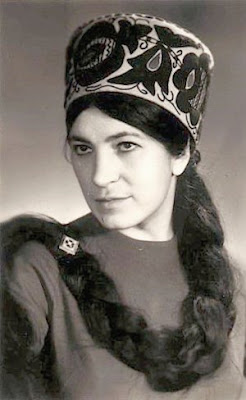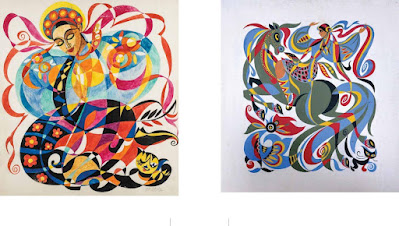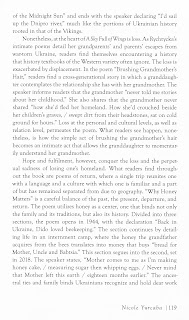My short story Bucha Spring was recently published in Fusion Magazine and I’m grateful for this opportunity to spotlight an amazing Ukrainian artist who sadly is no longer with us but whose brave spirit and artworks will be celebrated and passed on to future generations.
Like so many of us, I am thinking of Ukraine and its people as they courageously battle for their right to live as they choose in an independent Ukraine. There are so many stories that are and will be written about this brutal war, but Luba Panchenko’s legacy needs to be shared and celebrated. I came across her name in a short post on social media last spring and the more I learned, the more taken I was with her life story and incredible artwork.
Sharing my Author’s Note below and the link to my short story: https://www.fusionmagazine.org/bucha-spring/
My Author's Note on Bucha Spring:
This fictionalized short story is dedicated to the memory of Ukrainian artist and designer Liubov (Luba) Panchenko, who endured a month of isolation and starvation in her basement while her hometown of Bucha was under brutal Russian occupation. She survived the occupation, but died on April 30, 2022, when her heart gave out. During the Soviet era, her artwork was censored due to its focus on Ukrainian symbolism and folk culture. She was not allowed to exhibit or publish her work. She was a member of the Ukrainian Sixtiers dissident movement, that advocated for freedom of cultural and creative expression.
While researching Luba's story, I came across some excellent sources for those interested in learning more about her life and creative output. She was a rebel and she defied her family to pursue her passion as an artist. She credited her grandfather and mother for instilling in her a deep love for Ukraine. During the 1960s, many of her fellow dissident friends would gather at her house to sing Ukrainian Christmas carols, fundraise to help other dissidents in need and plan Ukrainian cultural and literary events. This was dangerous during the Soviet era and many of her friends were exiled, arrested and some like the artist Alla Horska, were killed.
Here's a nice piece about Luba Panchenko in Daily Art Magazine: https://www.dailyartmagazine.com/lyubov-panchenko/
And for my Ukrainian-speaking readers, a short article in Ukrainian: https://gazeta.ua/articles/ukraine-newspaper/_lyubov-panchenko-misyac-goloduvala/1091644
While writing my story, it was important for me to try to imagine her perspective as much as possible and I was thrilled when I found a video where I heard her speak about her artworks! What a gift! And check out her incredible fashion designs:
https://www.youtube.com/watch?v=tz-4ULkVlLk
A few more of her artworks:
























